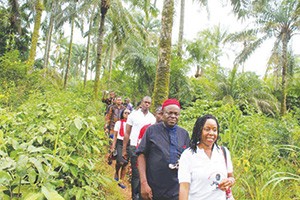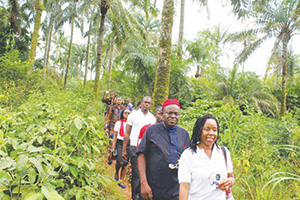The poetry festival in celebration of Christopher Okigbo’s 85th posthumous birthday took place in a two-day event consisting of a night of words around a bonfire and a day’s pilgrimage. The pilgrimage saw poets, writers and culture enthusiasts retrace the footsteps of the poet persona captured in Labyrinths – Okigbo’s slim collection of poems.

A birthday cake was cut in the Okigbo compound with his children (Obiageli and Onyebuchi), cousins, nephews and nieces in attendance. This pastry was served with sweet palm wine – the kind that could quickly leave one lost in its heady seduction.
A ride through the quiet town of Ojoto led the pilgrims to two shrines. This writer learnt that the first port of call is known as ‘Ukpaka-Oto’, while the second is identified as ‘Ide-oto’. The former being the male deity and the latter, the female; the source of whom Okigbo spoke: “Before you, my mother Idoto, Naked I stand; Before your weary presence, A prodigal…”
One could observe that of the two deities, only the male one was enshrined in a structure of concrete, with a metal grille in the middle and impressive carvings engraved into both flanks of its outer wall. On the walk to Ukpaka-Oto, a middle-aged priestess adorned in red wrapper, beads and head gear joined the procession. Dozens of pilgrims stood aside in awe as she moved to the head of the procession amid a rich blend of incantations and praise chants rendered by the minstrel, Okigbo Ibem. Before Ukpaka-Oto, silence reigned as the priestess proceeded to pay homage to her deity. She came bearing gifts – an egg, nzu (native chalk), and a piece of camwood, all items of worship.
As the priestess ended her veneration, the guest poets proceeded to read Okigbo’s popular verses from ‘The Passage’. But not before Obiageli Okigbo had played a recording of her father’s voice.
“Lion-hearted cedar forest, gonads of our thunder, Even if you are very far away, we invoke you: Give us our hollow heads of long-drums…”
The above lines from ‘Lament of the drums’ poured forth in Okigbo’s voice, mesmerising the pilgrims. For the majority, this would be their first audio encounter with Okigbo. The voice cracked with life, character and a potent, undeniable sign of his Igbo origins. The recording ended with:
“Thunder of tanks of giant iron steps of detonators, Fail safe from the clearing, we implore you: We are tuned for a feast-of-seven-souls.”
After Ukpaka-Oto, a second priestess appeared close to Ide-Oto shrine. These were but brief stops on the pilgrimage. After a ride on vehicles, the journey continued on bush paths surrounded by farmlands of mostly cassava and some oilbean. Okigbo Ibem’s invocations led the progression, echoed intermittently by the priestess’ responses. Like a labyrinth, the bush path wound along a slowly descending valley and forked left and right. Only once did the pilgrims miss their way, and as true pilgrims, we forked right and took a bend that led to the Otosi (bamboo grove) a few metres to River Idoto. The grove, a sedate halo of green canopies which the sun’s rays found impenetrable. Maybe this is what Okigbo meant when he wrote in Lustra (HEAVENSGATE 1962):
“Thundering drums and cannons in palm grove: the spirit is in ascent. I have visited; on palm bean imprinted my pentagon – I have visited, the prodigal…”
This scenic picnic ambience of the bamboo grove played host to all the pilgrims who rested their tired limbs, and luxuriated in the cool air while they awaited roasted corn on the hub served with roasted pear. This was also the spot where the poets would read poems in preparation for the final leg of the journey to mother Idoto whose banks lapped lovingly a short distance away.
The performances started with Iquo DianaAbasi Eke who sparked the grove with an Ibibio folksong and a poem titled ‘Voice from far away lands’, Uche Peter Umez, Tade Ipadeola and Nduka Otiono each took their turns reading poems from their collections that further heightened the expectations of the pilgrims. Then came Chuma Nwokolo who teased the audience with a witty poem titled ‘The courting of Adieleuwa’. Next came Dr. Chuma-Udeh and Amarachi Attamah. To round off the performances, as a final cleansing ritual before the pilgrims stepped before the hallowed banks of mother Idoto, Chijioke Amu-Nnadi performed the poems ‘Ablution’ and ‘Shrine’ to the accompaniment of long drums and a hypnotic oja (local flute).
The final spell had been spun, cleansing was now complete. Several eager pilgrims found their way through flooded and winding paths to River Idoto. As is wont to occur, not all pilgrims persevere to the final destination or revered site – in this case the river Idoto. Several people succumbed to hunger, others obeyed their limbs’ call for rest. Of the six guest poets, only four made it to the river.
In her watery presence, these last standing poets – Chuma Nwokolo, Uche Umez, Iquo DianaAbasi and Chijioke Amu-Nnadi, read Okigbo’s ‘Dark waters of the beginning’ to round off the pilgrimage. An indeed invigorating experience, each man, woman left there enraptured – never to remain the same.
• Iquo Eke is an award-winning Lagos-based poet.













